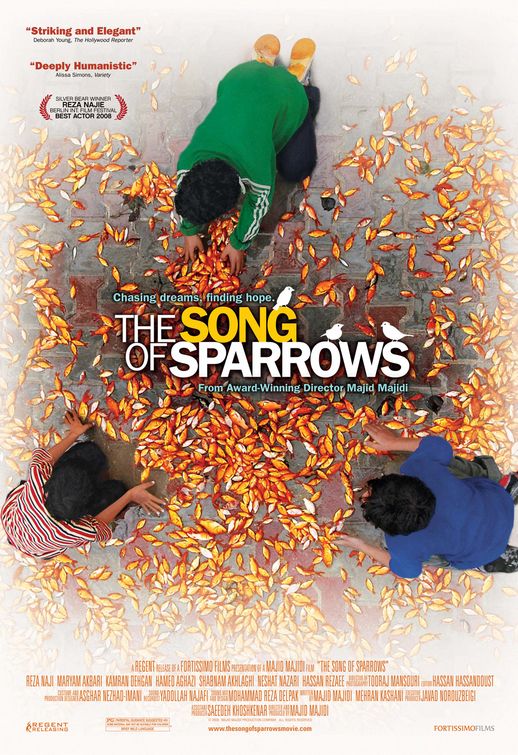“Balancing Family and Work”

| None | Light | Moderate | Heavy | |
|---|---|---|---|---|
| Language | ||||
| Violence | ||||
| Sex | ||||
| Nudity |
What You Need To Know:
THE SONG OF SPARROWS is sometimes too cryptic. It is not always clear what values the movie espouses or what everything means, though it is clear that the movie honors family duty and bonds between family members. Ultimately, the movie seems to have a strong Romantic worldview where the allegedly laid-back life of rural society is preferable to the materialism, greed and bustling life of today’s modern cities.
Content:
(RoRo, ACap, BB, FRFR, L, V, D, M) Relatively strong but not contentious or didactic Romantic, anti-capitalist worldview set in a Muslim country, counterbalanced by some strong moral elements supporting family, plus some overt references to the false religion Islam but that is somewhat incidental to the story and premise; four obscenities and one light profanity; light violence includes man injures himself in an accident; no sex; no nudity; no alcohol use; smoking; and, materialism and capitalism are rebuked a bit too strongly to fit the movie’s Romantic worldview.
More Detail:
Karim rides on his small motorcycle to Tehran to see if the hearing aid can be repaired. It cannot, but Karim doesn’t have the money to pay for a new one. His financial woes are relieved, however, when a man demands that Karim give him a ride for money. So, Karim starts a taxi service in the city, where he also finds all kinds of rummage to sell.
Karim’s hunt for material goods transforms his generous and honest nature, much to the distress of his wife, daughters and neighbors. When he gets injured and is forced to stay home, he must discover a way to reconcile his old values with his new life.
THE SONG OF SPARROWS is too cryptic for its own good. It is not always clear what values the movie espouses or what everything means, though it is clear that the movie honors family duty and bonds between family members. Though there are overt, fairly positive references to the false religion of Islam, those are not the movie’s primary focus.
The movie does, however, seem to have a slightly anti-capitalist message, especially during the scenes focusing on the aimless hustle and bustle of the modern city, as depicted in Tehran, Iran. Thus, the filmmakers seem to support a somewhat Romantic worldview where the allegedly more laid-back lifestyle of rural communities is preferred.
Examined from this perspective, the movie’s symbolism regarding ostriches, sparrows and fish begins to make more sense. For example, the ending seems to be saying that a narrow focus on material goods and earning a living destroys the balance in people’s family life and their relationship to nature and its wonder and beauty. This is not necessarily an unbiblical message. After all, though the Bible values hard work and private property, it also says that family relationships and commitments are also important. That said, the movie’s viewpoint seems to lean too much toward the Romantic, anti-capitalist side, but not in a very didactic way.


 - Content:
- Content: 

